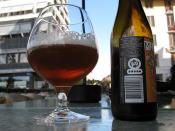"Make it new", said Ezra Pound. What was new in Modernist poetry?
Modernism was a complex movement, including many unique and varied features in its odd period of development in European and American writers. Broadly and retrospectively, four features were common; experimentation, anti-realism, intellectualism and individualism, although excellent Modernist poets can be found that only partly fulfil these requirements. As well as Ezra Pound many poets and other writers came to light including T.S Elliot, Joyce, Yeats, and Lawrence. Two excellent examples of Modernist poets include D.H Lawrence, with poems such as Snake and A Woman and her Dead Husband, and T.S Elliot including poems like The Hollow Men, and The Hippopotamus.
Taking Modernism's manipulation of intellectualism as the first point of investigation, a typical poem may include tentative, analytical and fragmentary work; for example posing questions with the poet's opinion on the matter rather than answering them with the accepted norm.
Fragmentation also works as a rejection of Realism due to the use of a stream of consciousness style of composition;
Here we go round the prickly pear
Prickly pear prickly pear
Here we go round the prickly pear
At five o' clock in the morning.
Stream of consciousness is essentially a narrative technique in which a writer presents directly the uninterrupted flow of a character's thoughts, impressions, and feelings, without the conventional devices of dialogue, punctuation and description. Leading exponents of stream of consciousness have included the novelists Virginia Woolf, James Joyce, and William Faulkner. In narrative literature, Molly Bloom's soliloquy in Joyce's Ulysses is a good example of the technique.
As well as the "prickly pear" stanza, stream of consciousness is further demonstrated in The Hollow Men throughout the rest of the final verse with a severe lack of punctuation, in fact from the beginning of...


